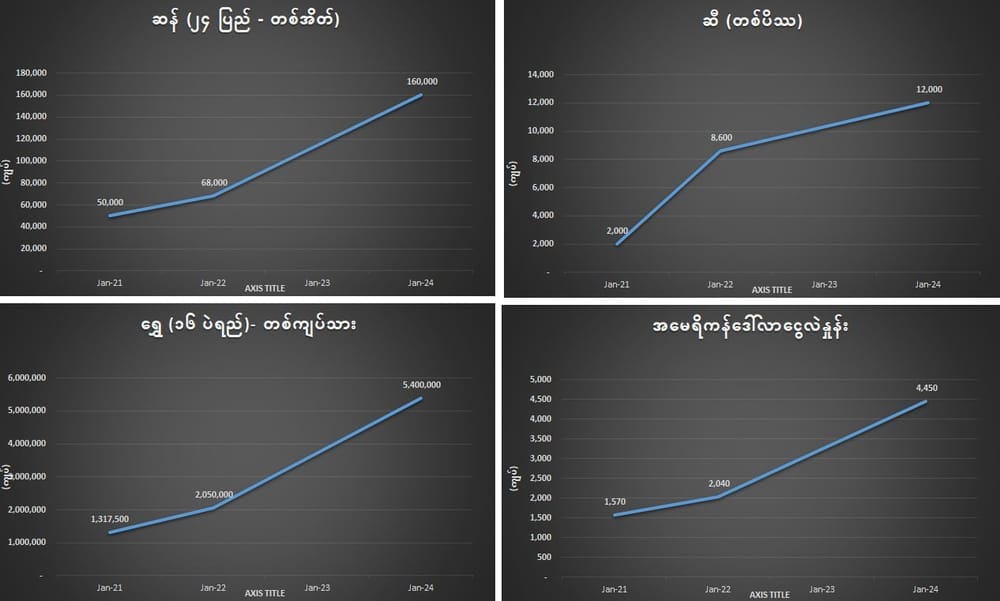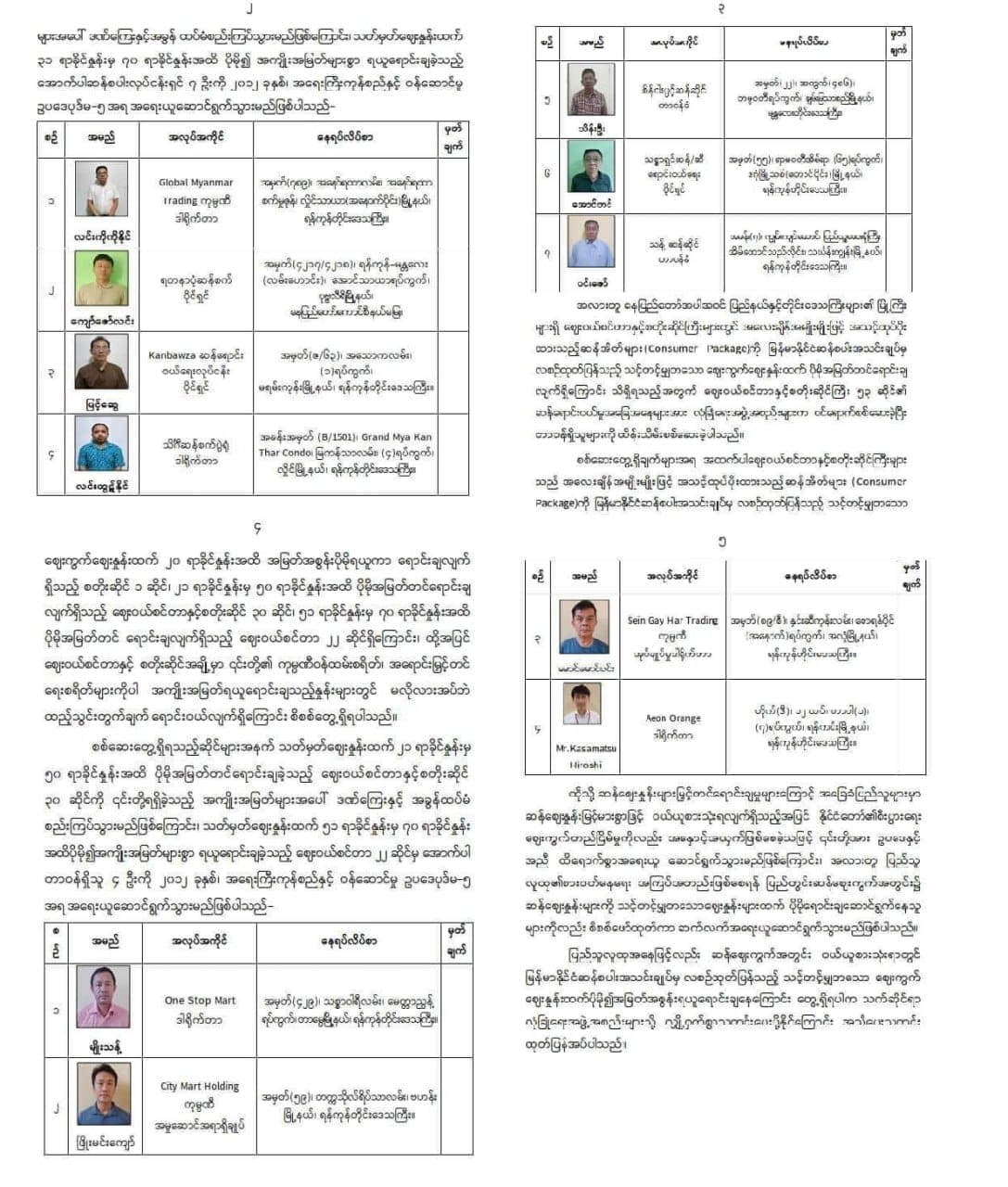
The economic landscape of Myanmar has undergone significant changes since 2021. The previously functioning market economy system, albeit informal in some aspects, has been replaced by a new economic model.
This new model is characterized by the government's desire to control everything, with high levels of centralization and interventionist policies. For clarity, let's call this the "command economy" system.
The origins of this command economy can be traced back to the general increase in commodity prices. But what caused this price hike? It all started with political instability and a lack of peace.
Let's set aside politics for a moment and focus on the command economy itself.
After 2021, there was a significant increase in general commodity prices. For example, a bag of rice that cost 50,000 kyats before 2021 now costs 160,000 kyats. Previously, a viss (1.63 kg) of oil cost 2,000 kyats, but now, even when rationed and sold with people queuing up, it costs 5,500 kyats per viss. In the open market, the price has reached 12,000 kyats. Similarly, other prices have increased as well. The chart also shows how much gold and dollar prices have risen.

Looking at the chart, you'll see that rice prices have more than tripled, oil prices have increased more than 6 times, gold prices have quadrupled, and the dollar has nearly tripled in value.
In addition to rising commodity prices, another issue is the increasing demand for dollars. The dollar shortage became so severe that in 2022, there were significant power outages due to the inability to purchase Liquefied Natural Gas (LNG) for electricity generation due to a lack of dollars.
This increasing demand for dollars and rising commodity prices have breathed life into the command economy.
The first manifestation of this was the banning of certain imports by decree. When imports were restricted to prevent dollar outflows, it led to a cyclical effect where import prices denominated in dollars rose even higher.
Next, as the domestic economy became unstable and people lost confidence in other investments, they turned to the relatively safe gold and real estate markets. This drove up house and gold prices.
As gold prices rose, there were raids and arrests of gold traders in the Shwebontha area. It's worth noting that gold traders have been speculating since before, but their greed intensified during these politically unstable times. Gold traders have been summoned and interrogated at least three times since 2021. By 2024, even well-known gold shop owners were issued arrest warrants, and gold prices were mandated to follow rates set by the Yangon Region Gold Entrepreneurs Association.
As a result, the command economy has taken hold in the gold market, with shops now selling at prices set by the Yangon Region Gold Entrepreneurs Association (YGEA). However, if you want 16-karat Academy gold, you can't buy it at the YGEA-set price. The quiet market price is over 5.4 million kyats, while the YGEA price is just over 4.7 million kyats.
Another sector affected is fuel. To avoid getting bogged down in details, let's focus on the general concept. When domestic fuel prices rose, business owners cited the high dollar exchange rate as the reason. To address this, the Central Bank sold dollars to fuel businesses at the official exchange rate. Despite the significant difference between the Central Bank rate and the market rate, fuel prices didn't decrease. Why? Because the dollar sales couldn't meet market demand. This led to mandated inspections of business owners.
The latest commodity to fall under the command economy is rice. Before we discuss rice, let's talk about the prominent Myanmar Rice Federation. The former chairman of this association was U Chit Khaing, the chairman of the famous Eden Group of Companies. He is currently under investigation at Insein. Later, he took on the role of patron, with U Ye Htut Naing taking charge. Their establishment, MAPCO, is well-known in Myanmar. They export rice and are excellent at market penetration. Even during political instability, they managed to export rice to Bangladesh. They have been able to collaborate with successive governments and are known for generating foreign income for the country.
However, rice prices have recently increased due to various factors. A bag of rice that cost around 50,000 kyats in 2021 now costs 160,000 kyats, a threefold increase. While people might manage without buying gold or houses when prices rise, rising rice prices cause significant hardship. Consequently, the command economy has come into play here as well. In the last week of June, like the gold traders, some rice traders and sellers were arrested. Additionally, people from stores were arrested for selling above the set price. Look at the announcements made at the end of June 2024 below.

By now, you should be able to estimate whether the command economy in Myanmar is alive or not.
Now that we understand the ground situation, let's discuss some theory. Theory can be boring, so we'll keep it simple.
In the field of economics, Adam Smith and John Maynard Keynes are very prominent figures. Adam Smith is even called the father of economics. He spoke about the concept of a free market (Laissez-Faire).
The idea is that the market should be free. The market should be left to the forces of supply and demand. The "Invisible Hand" of supply and demand will regulate the market on its own.
Later, John Maynard Keynes proposed another theory. This is the concept of a Managed Market. The government should regulate the market. How? By implementing rules, regulations, and policies where necessary.
The world experienced the Great Depression around 1929-30. After that, Keynes' concept of government intervention in the market when necessary became prominent as countries tried to recover economically. It actually worked.
It's important to note that Keynes' managed market concept is different from the command economy currently in effect in Myanmar. Keynes talked about regulating the market with policies, not commands.
Let me give you a clear example. Suppose domestic car prices are rising. The government might implement a policy allowing car imports. As cars are imported competitively, car prices would fall. This is just an example, and of course, other impacts would need to be considered. So, allowing car imports is a way for the government to regulate the market through policy.
Arresting people who sell cars because prices are high is not the solution. Similarly, arresting merchants because commodity prices have risen is not the answer.
Therefore, in Myanmar, reducing prices by decree, arresting merchants to lower prices, or using handheld loudspeakers in markets to announce fixed prices for chicken or pork per viss are not solutions.
By now, I believe you should have a good understanding of Myanmar's economic situation and whether the command economy has come to life.
Han Thit Eain (Y3A)
Build Myanmar Media: Daily News - Sharing Myanmar's Important News Daily
Build Myanmar Daily News brings you the most crucial updates from Myanmar and around the world every day. An essential news source for Myanmar citizens who want to stay informed. Sign up now to get the latest insights directly to your mailbox from the Myanmar's No.1 Tech and Business News source.
📅 New updates every day before 9:00 pm, MMT.
📰 Read on:
- Website: https://www.buildmyanmarmedia.com/
- Facebook: https://www.facebook.com/buildmyanmar
- YouTube: https://youtube.com/@buildmyanmarmedia
- Telegram: https://t.me/+6_0G6CLwrwMwZTIx
- Inquiry: info@buildmyanmar.org
#BuildMyanmarNews #DailyNewsMyanmar #MyanmarUpdates #MyanmarNews #BuildMyanmarMedia #MyanmarNews #GlobalNews #TechNewsMyanmar #BusinessNewsMyanmar #Updates #Insights #Media #MyanmarMedia
Sign up for Build Myanmar - Media
Myanmar's leading Media Brand focusing on rebuilding Myanmar. We cover emerging tech, youth development and market insights.
No spam. Unsubscribe anytime.
